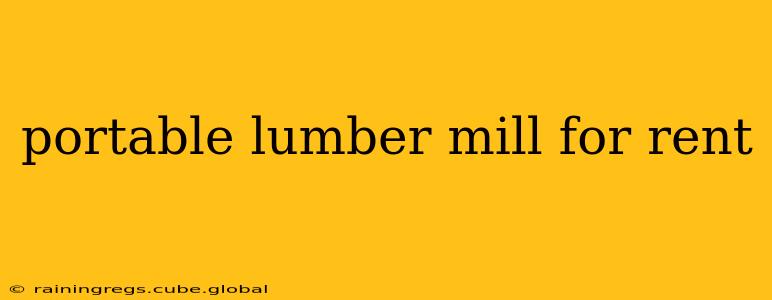Looking to rent a portable sawmill? Whether you're a seasoned woodworker tackling a large project, a DIY enthusiast taking on a smaller-scale endeavor, or a landowner looking to sustainably manage your timber, renting a portable lumber mill offers a cost-effective and efficient solution. This guide will help you navigate the process, from understanding the different types available to finding the right rental option for your needs.
What are the Different Types of Portable Sawmills?
Portable sawmills come in various designs, each with its own strengths and weaknesses. Understanding these differences is crucial in selecting the right tool for your project.
1. Band Sawmills: These are known for their precise cuts and ability to handle larger logs. They utilize a continuous band blade, offering smoother surfaces and less kerf (the width of the cut) than circular sawmills. Rental options for band sawmills often come with varying blade sizes and power options, making them adaptable to different log sizes and project demands.
2. Circular Sawmills: These are typically more affordable to rent than band sawmills and are often favored for smaller-scale projects or those requiring faster cutting speeds. They utilize a circular blade, which is generally less precise than a band saw but suitable for many applications.
3. Chainsaw Mills: These are the most basic and often the most affordable option. They utilize a modified chainsaw attached to a frame, making them highly portable and well-suited for felling trees and producing rough lumber. However, they usually produce less precise cuts compared to band or circular sawmills.
What Factors Should I Consider When Renting a Portable Sawmill?
Choosing the right portable sawmill for rent requires careful consideration of several factors:
1. Log Size and Species: The dimensions of the logs you intend to mill will significantly influence your sawmill choice. Larger logs require more powerful and robust sawmills, often those with larger blades. The hardness of the wood species will also impact the cutting process; harder woods may require a more durable blade and potentially a more powerful machine.
2. Project Scope: A small-scale project might only need a basic chainsaw mill or a smaller circular sawmill, whereas a larger project might necessitate a more powerful band sawmill. Consider the quantity of lumber you need to produce.
3. Rental Costs and Duration: Compare rental rates from different suppliers. Consider the duration of your project to determine whether a short-term or long-term rental is more cost-effective. Be sure to clarify all costs associated with the rental, including delivery, pickup, and any potential damage fees.
4. Experience Level: Operating a portable sawmill requires skill and safety precautions. If you're a novice, renting a simpler model like a smaller circular sawmill might be advisable. Consider whether the rental company provides training or instruction.
How Much Does it Cost to Rent a Portable Sawmill?
Rental costs vary significantly based on the type of sawmill, rental duration, and location. Expect daily, weekly, or monthly rental rates, with larger and more advanced sawmills costing more. Always obtain a detailed quote from the rental supplier before committing.
Where Can I Find Portable Sawmills for Rent?
You can typically find portable sawmills for rent at equipment rental companies, farm supply stores, or through specialized forestry equipment rental businesses. Online searches can also be helpful in locating rental options in your area.
What safety precautions should I take when using a rented portable sawmill?
Safety is paramount when operating any sawmill. Always wear appropriate personal protective equipment (PPE), including safety glasses, hearing protection, and sturdy work gloves. Ensure the sawmill is properly set up and maintained according to the rental company’s instructions. Never operate the sawmill if you are fatigued or under the influence of alcohol or drugs. Proper training is essential before operating any sawmill.
What are the advantages of renting versus buying a portable sawmill?
Renting offers several advantages:
- Cost Savings: Renting avoids the significant upfront investment associated with purchasing a sawmill.
- Flexibility: Renting allows you to choose the specific type and size of sawmill best suited for your needs.
- No Maintenance: The rental company is typically responsible for the maintenance and upkeep of the equipment.
By carefully considering these factors, you can find the perfect portable sawmill for rent and successfully complete your lumber milling project. Remember to always prioritize safety and follow the instructions provided by the rental company.
